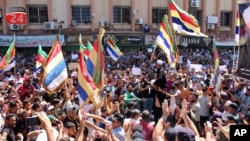Senior U.S. officials visited Syria's eastern oil-rich Deir el-Zour province on Sunday in an attempt to defuse an uprising by Arab tribes against Kurdish rule that is destabilizing northeast Syria, U.S. officials, security sources, and residents said.
An Arab tribal backlash against the rule of the Kurdish YPG militia has led to clashes, with over 150 killed and dozens injured. The militia forms the backbone of the U.S.-backed Syrian Democratic Forces (SDF), and the uprising is the biggest threat to their rule since they finally drove Islamic State out of a swathe of the country's north and east in 2019.
U.S. Deputy Assistant Secretary of State for Syria Ethan Goldrich and Major General Joel Vowell, who heads the coalition against Islamic State, met Arab tribal leaders and SDF commanders and agreed to "address local grievances" and "de-escalate violence as soon as possible and avoid casualties," the State Department said.
The arrest of a renegade Arab commander last month by the SDF sparked unrest that soon swept a string of towns from Busayrah to Shuhail, in a strategic oil belt in the heart of Arab tribal territory east of the Euphrates River.
Arab tribal fighters initially drove out the Kurdish-led forces from several large towns, but the SDF has begun to regain the upper hand.
U.S. military presence in the SDF-run areas has checked the expansion of militias backed by Russia and Iran, who have a foothold in areas west of the Euphrates River area and who SDF officials say are exploiting the internal divisions to spread their influence.
A spokesman for the SDF accused Iran and the Damascus government of sending tribal militias to create havoc in the northeast of Syria, where most of the nearly 900 U.S. troops in the country are stationed.
Arab tribal leaders say they have been deprived of their oil wealth after the Kurdish-led forces laid their hands on Syria's biggest oil wells after the departure of Islamic State. They also complain their areas are neglected in favor of Kurdish-majority areas.
"We want them out of all of Deir el-Zour, we want the administration of the area in the hands of the original Arab inhabitants," said Sheikh Mahmoud al Jarallah, a tribal leader.
The Kurdish leadership of the SDF denies it discriminates against the predominately Arab population under its rule, blaming Islamic State remnants for intimidating locals and preventing the area's development.
Washington has pushed for a bigger say for Arab inhabitants in running their affairs in SDF areas, Western diplomats say.





